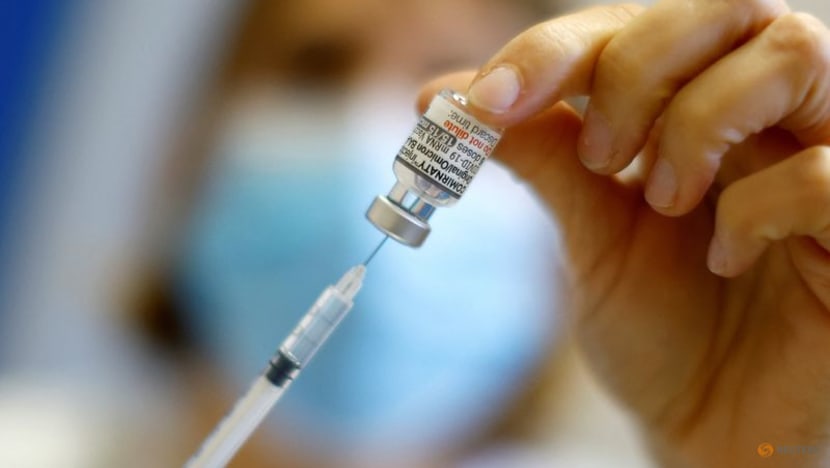Adverse effects rare after bivalent COVID-19 vaccine jabs: HSA report

SINGAPORE: Adverse effects after the bivalent COVID-19 vaccine shots are rare, according to a Health Sciences Authority (HSA) safety update released on Thursday (Feb 2).
The authority received 59 and 11 adverse event reports for the Moderna/Spikevax COVID-19 bivalent vaccine and Pfizer-BioNTech/Comirnaty COVID-19 bivalent vaccine respectively.
More than 482,600 doses of the Moderna bivalent vaccine have been administered since it was rolled out in Singapore on Oct 14 last year, while more than 202,300 Pfizer-BioNTech bivalent jabs have been given since Dec 12, 2022.
This means the HSA saw an adverse event reporting rate of 0.012 per cent for the Moderna bivalent vaccine and a smaller 0.005 per cent for the Pfizer-BioNTech bivalent vaccine.
The adverse events reported for the bivalent mRNA vaccines were similar to those that took the monovalent vaccine. The non-serious adverse events include allergic reactions such as a rash, eyelid swelling, fever, giddiness, chest discomfort or an increase in blood pressure.
There were also six serious adverse events reported for the Moderna bivalent vaccine and two such events for the Pfizer-BioNTech bivalent vaccine.
These include serious allergic reactions, anaphylaxis, myocarditis, hypotension with tachycardia – fast heartbeat – and hearing loss, said HSA.
An adverse event is classified as serious when it resulted in hospitalisation, a significant reduction in functioning level, a life-threatening illness or death.
The serious adverse events reporting rates for the two bivalent vaccines are similar, at 0.001 per cent.
HSA's latest update covers the period from the roll-out of the vaccines on Dec 30, 2020, to Dec 31, 2022. This is the first HSA safety update to include data on the bivalent shots.
Including the monovalent mRNA vaccines, more than 10.5 million primary doses, 4.6 million first booster doses and 1.2 million second booster shots have been administered in Singapore as of Dec 31, 2022.
The reporting rates of adverse and serious adverse events for the mRNA vaccines remained rare, at 0.11 per cent (17,741 reports) and 0.007 per cent (1,119 reports) respectively.
There were 173 serious adverse event reports (0.004 per cent) for the first booster jab and 17 such reports (0.001 per cent) for the second booster shot.
ADVERSE EVENTS IN CHILDREN
The Moderna vaccine was rolled out on Oct 25 last year as a primary vaccine for children aged six months to four years, while the Pfizer-BioNTech jab was also made available as a booster for children aged five years to 11 years.
As of Dec 31, 2022, more than 16,000 doses of the Moderna vaccine have been administered to children aged six months to four years, and more than 81,000 Pfizer-BioNTech booster jabs have been given to children aged five years to 11 years.
Serious adverse events after COVID-19 vaccination in children aged six months to 11 years are rare, said HSA.
There were eight adverse event reports after children aged six months to four years who took the Moderna jab, including five serious events that included fever, vomiting, fits, and Kawasaki disease – the swelling of blood vessels.
"Febrile seizures and Kawasaki disease are rare events that have been reported following childhood vaccination and can be associated with childhood illnesses. All the children have recovered or were recovering at the time of report," said HSA.
There were 26 adverse event reports from the Pfizer-BioNTech booster jab for children aged five years to 11 years – a reporting rate of 0.03 per cent. This was lower than the adverse event reporting rate for the primary vaccination series in this age group, which stood at 0.15 per cent.
There were also two serious adverse events, with one describing myocarditis – the inflammation of heart muscles – and the other was a drop in platelet count.
Both children were recovering at the time of the report, said HSA.
There have also been overseas cases of myocarditis reported with the booster doses of the mRNA COVID-19 vaccines in this age group, said HSA, adding that incidence remains rare and is generally lower compared to adolescents and adults.
It said that it is closely monitoring the adverse events and assessing them in the context of their background rate.
"Based on our assessment of current local and overseas data, no new safety signals have been identified with the use of the vaccines in this age group," HSA added.
OTHER VACCINES
More than 40,800 doses of the Nuvaxovid vaccine have been administered as of Dec 31, 2022, with a serious adverse event reporting rate of 0.02 per cent.
About 722,400 doses of the Sinovac-CoronaVac and Sinopharm inactivated vaccines have also been given, with a serious adverse reporting rate of 0.006 per cent.
The benefits of getting vaccinated with the mRNA, Nuxaxovid or inactivated vaccines "continue to outweigh the known risks", said HSA.
"Vaccination has been demonstrated to be the most effective way to reduce deaths and severe illness from COVID-19 infection and has enabled Singapore to ease most of the safe management measures," it added.
BOOKMARK THIS: Our comprehensive coverage of the COVID-19 pandemic and its developments
Download our app or subscribe to our Telegram channel for the latest updates on the coronavirus pandemic: https://cna.asia/telegram














